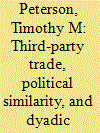| Srl | Item |
| 1 |
ID:
177022


|
|
|
|
|
| Summary/Abstract |
This study argues that the effect of third-party trade on dyadic conflicts is conditional on the naval power of both the potential conflict initiator and its target state. This conditional effect occurs mainly because naval power allows trade-integrated initiators to reduce their trade dependence on a given trade partner and its allies more easily. At the same time, the target’s naval power increases the costs that conflict inflict on the initiator’s trade. As maritime trade accounts for about 80 percent of world trade volume, naval capability has an important effect on combatant states’ ability to substitute trading partners during a conflict and to mitigate trade-related costs, thereby affecting the relationship between third-party trade and conflict. The findings of our statistical analyses support our theoretical expectation that the pacifying effect of third-party trade diminishes as the initiator’s naval power increases, yet increases as the naval power of the potential target increases.
|
|
|
|
|
|
|
|
|
|
|
|
|
|
|
|
| 2 |
ID:
103716


|
|
|
|
|
| Publication |
2011.
|
| Summary/Abstract |
A growing literature maintains that trade is pacifying to interstate relations, and recent work on trade networks suggests that this pacifying effect extends to indirect trade ties. In this article, it is argued that third-party trade can also have an aggravating effect within dyads, by threatening to alter the dyadic balance of capabilities. For the state trading outside the dyad, trade gains from third parties provide incentives to demand change in the dyadic status quo and finance violent conflict when dyadic disputes arise. For the state whose dyadic partner trades with third parties, potential for the trading state to grow increasingly more powerful encourages action to prevent erosion of the non-trading state's relative power. These aggravating effects are conditional, however, on dyadic political similarity, as concerns for relative capability shifts decrease when states do not view their dyadic partners as threats. Hypotheses derived from this argument are tested on data spanning 1885 to 2000. Results support these hypotheses, suggesting important implications for the literature on trade and conflict. When extending the relative gains arguments associated with realism beyond the dyad, a clear, yet conditional, aggravating effect of third-party trade emerges.
|
|
|
|
|
|
|
|
|
|
|
|
|
|
|
|